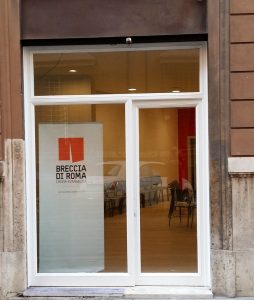For thousands of years Rome has been called “The Eternal City.” She was given this name by the Ancients who believed nothing could destroy her. Regardless of the empires and conquerors that have come and gone, Rome has always stood. She has been burnt to the ground, sacked by barbarians, and ripped apart by civil war, and has lived to tell about it. Surely she will endure forever.
But now, Rome realizes that within her walls no place is safe. City centers, public transportation, schools, parks, cafes and theaters are all potential targets. At any moment and at any place, terror could strike. Lives could be lost. Thousands of years of history represented in the buildings and streets could be destroyed in an instant. Worst of all, the future could be a nightmare.
What is their perspective on their current context? How are they applying the truths of the gospel to the fears they are facing on a daily basis? How are they living as the Body of Christ? What can we, the American Church, learn from their example?
Leonardo De Chirico is the pastor of Breccia di Roma, a Baptist church in the heart of Rome. I asked him to share how their local body is walking in light of the precarious circumstances they are facing.
What are specific fears the people are facing, and how are you addressing them both theologically and practically?
“We are an evangelical church living in a majority Catholic culture in the heart of the big city of Rome. Traditionally, evangelical Christians in my country are used to being exposed to questions like, ‘Why do you do this? Why don’t you do that?’ In a situation like ours, you can’t simply follow the mainstream; you are constantly called to give reasons for who you are in Christ. Experiencing vulnerability is our daily bread. Decades ago this could involve degrees of persecution; nowadays it remains a social stigma or prejudice because we are ‘different.’
“On top of that, we are involved in some ministries that involve some risks. For example, the space where we meet for corporate worship is right in the heart of Rome. Many would discourage this given the fact that city centers have become risky places. Additionally, we open up our Church’s rented space twice a week to help Muslim refugees. Instead of closing ourselves off from them and locking our doors, we open them. We use it as a place of peace and hospitality for those who have been forcibly displaced.
“Opening our doors provides an avenue for us to build genuine friendships and help the Muslim refugees integrate into life here in Italy. We have found the young men between the ages of 16-24 in particular speak of the loss of dignity, loneliness and boredom they experience daily. They long for friendship, education and employment to begin a new life of hope and peace. Instead, they find themselves isolated, hopeless and invisible, wandering from charity to charity seeking a meal or blanket.
“Many have expressed concern about us welcoming these Muslim refugees twice a week in the same rented space where we have our Sunday services. Is it safe? Why would we open ourselves up to such risk? But what is the alternative? Should we stop doing it out of fear?”
Instead of closing ourselves off from our Muslim neighbors and locking our doors, we open them.
What other ways are you caring for your congregation as they process the recent terror attacks and general terror threat?
“The preaching of the word is central. We have just finished a series on Daniel. There you have a minority experiencing human trauma and vexation in the context of a fierce empire. What do they do? They are faithful to their calling, highly adaptable but not at the expense of their identity. They take risks. They are steady. There is a spiritual battle that goes on, and Daniel receives a hint of it in his visions. It’s amazing to see how the book of Daniel can speak words of encouragement, direction and inspiration to a church in Rome!
“We are also fervent in prayer. We bring what we do before the Lord: evangelism, refugee ministries, public witness, etc. asking God to honor his name and to use us. We do regularly pray for the international scene, for the persecuted church, for the families of victims. Hiding from problems and trying to remove ourselves from risk is not the way forward; praying over them is the Christian way.”
How do you believe the Church should be responding?
“I sense that our culture has made ‘safety’ an idol of our age. Everything must be safe and under total control. There is nothing wrong with safety and comfort, but we have exchanged Christian assurance and hope with a suffering-free and zero-risk life.
“If the gospel calls us to confront the spiritual powers of the age in the name of Christ, be they religious or secular, there can be no real assurance of human safety for those who are serious about it. We don’t want to be heroes, just followers of Jesus Christ. He himself assured us we would face persecution but that he would be with us always. Are the servants greater than the master?”
We have exchanged Christian assurance and hope with a suffering-free and zero-risk life.
What are specific ways your Church is seeking to be an agent of redemption during this time?
“The church always needs to be the church, committed to the preaching of the Word of God, the ordinances that Jesus has given us and to spiritual disciplines. In our time, we should be careful not to build a culture of human ‘fear’ that needs a human enemy to fight against. Nor should we buy into the theology of political correctness that thinks that we live in an appeased world where what is ‘nice’ will win the day.
“Our battle is not against flesh and blood. Our war is against all that stands against the knowledge of God, be they religious ideologies or secular projects. We fight this battle with our naked hands joined in prayer, with our hearts clothed in love and relentlessly living out the gospel whatever we do wherever we are.”
The example of the Christians in Rome is a challenging one for the Church in America. They are rooting themselves in Christ as their hope and allowing that hope to flow out in the way they live their lives.
They aren’t hiding; they aren’t closing doors. Instead, they are ever-more present in their city, holding fast to the word of truth and being a means of grace to those around them regardless of the cost or the criticism. In so doing, they proclaim to Rome that they do not put their hope in “The Eternal City,” but seek the city that is to come.
Image Credit: Markus Bernet, Wikimedia Commons





No comments have been added.